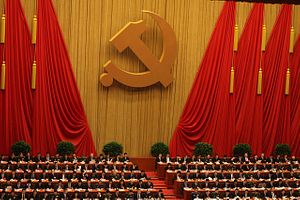The current issue of The New Criterion contains a “Letter from Beijing” by Arthur Waldron, the Lauder Professor of International Relations at the University of Pennsylvania and one of America’s foremost experts on China. Last winter, Waldron attended the funeral of a renowned Chinese soloist, and afterward talked to someone he identifies only as “a brain-truster for the [Chinese] central government,” a man who “worked at the center” of China’s power structure, who “was on a first-name basis with scores of the highest officials,” who “read the secrets every day.” This Chinese insider bluntly stated to Waldron that China’s political system does not work. “If we place our foot incorrectly,” the insider warned, “we could begin a disaster, violence and civil war.”
This is not the rosy picture of a rising China that normally fills the airwaves and popular media throughout much of Asia and the world. “China viewed from the inside is very different than China viewed from the outside,” the man told Waldron.
Waldron relates that he soon observed the phenomenon noted by the insider. He and his Chinese friends stood in line behind about a dozen people he describes as “motionless . . . drab, glum, calm, resigned,” who were waiting “for their morning meal of scalding hot cabbage and mystery meat” from a small kitchen located on a “rundown square.” When one of Waldron’s colleagues left the line for a moment then returned, a woman standing in line began yelling obscenities which triggered others in the line to do likewise, then the “whole previously passive line exploded,” shouting, cursing, and striking each other. After about a minute it was over.
Waldron’s Chinese friends immediately assured him that he had finally seen “what China is really all about.” This, they told him, was “the real China.”
The other China—the military parades, the growing fleet, nuclear rockets, bullying of neighbors in the South China Sea, and the wealthy Communist Party cadres—is the surface underneath which lies “pressurized anger” and “stomachs full of qi.”
The façade of a rising China on its way to becoming the next superpower, according to Waldron, hides the reality that after nearly 70 years in power the Communist Party has not attained one of its avowed goals—bringing about “a decent life for ordinary people.”
Instead, there are two Chinas—the China of the Communist Party and their urban dwelling associates and beneficiaries, who constitute the ruling elite or nomenklatura, and the hundreds of millions of people, many who live in the countryside “with no proper education, transport, [or] medical care.”
Waldron’s letter in The New Criterion brought to mind Michael Voslensky’s book Nomenklatura, written in 1984, when most Soviet experts in the West believed that the Soviet Union would endure well into the 21st century. Voslensky, a former Soviet insider, brought to light the parasitic nature of the communist ruling class in Russia. “The parasitic tendencies of a ruling class,” he wrote, “are the consequences of its monopoly position.” The nomenklatura is an “exploiting, privileged class . . . exercising dictatorial power” not to bring about a classless society but to attain power and privileges for the ruling elite. Voslensky’s book exposed “the antagonistic structure of the real socialist society.” Five years after the publication of Voslensky’s book, the Soviet Union collapsed.
Voslesnky’s analysis in Nomenklatura had much in common with the sociological studies of Vilfredo Pareto, Robert Michels and Gaetano Mosca, whose works were brilliantly synthesized by James Burnham in his 1943 book The Machiavellians. These political philosophers believed that a ruling class or elite governed in all countries, not just communist countries, and that the principal goal of all ruling classes was to maintain and increase their power and privileges.
Arthur Waldron writes that at the start of the communist revolution in 1949, the Party’s purpose was “to save the Chinese people, to lift them up to a better life.” “Now,” he continues, “the Party is the purpose: it has become an oligarchy . . . [who] feel no sense whatsoever of social mission to the Chinese people.” “Now the role of the Chinese people,” he notes, “has become to support and save and be ruled by the Party.”
Waldron is perhaps too generous to the founding generation of China’s communist leaders. Pareto, Michels, Mosca, and Burnham would likely say that Mao Zedong’s purpose right from the beginning was a Leninist-Stalinist monopoly of power and privilege in society. But they would surely agree with Waldron that for today’s ruling elite in China—China’s nomenklatura—[m]aintaining Party rule, whatever the means, is the true purpose of all actions” of the communist ruling elite. This phenomenon, Waldron soberly concludes, “is slowly breaking the spirit of one of the world’s greatest civilizations.”

































